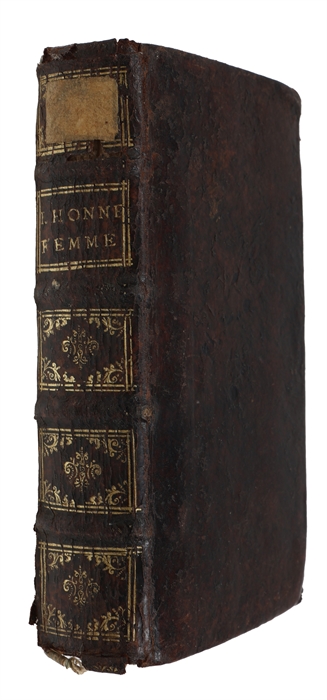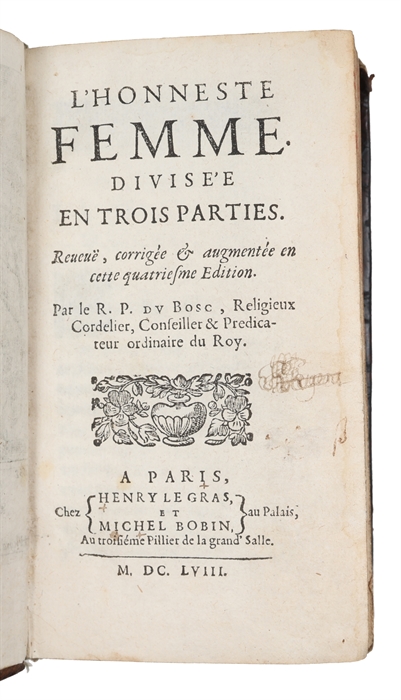RARE FEMINIST WORK
DU BOSC, JACQUES.
L'onneste femme, divisée en trois parties. Reveue, corrigée et augmentée en cette quatriesme edition.
Paris, Le Gras & Bobin, 1658.
8vo. In contemporary half calf with four raised bands and gilt lettering and ornamentation to spine. Wear to extremities. Spine-ends chipped. Previous owner's name to title-page. Frontispiece slightly miscoloured and last leaves with dampstain in margin, otherwise internally nice. (22), 335, (50), 252 pp.
The rare fourth edition of Du Bosc’s highly popular and influential feminist work, being the first major theorizations of ‘honnêteté’ for women. “The seventeenth-century French ideology of honnêteté—a then emerging code of conduct related to sociability, urbanity, and politeness—transformed elite French society from a military class to a cultural aristocracy. Women played a key role in this social transformation as both practitioners and enforcers of these new conventions. Whereas critics have studied the honnête homme as the embodiment of this new secular social ideal, research into the philosophy shaping the honnête femme has been scant at best. Jacques Du Bosc’s L’Honnête femme: he Respectable Woman in Society and the New Collection of Letters and Responses by Contemporary Women, the first major theorizations of honnêteté for women, provide valuable insights into the honnête femme for current students and scholars. In these works, Du Bosc proposes what he calls in part three of L’Honnête femme a comprehensive “science for women.” His honnête femme is a purely social being free from domestic cares. hus, Du Bosc focuses his treatise exclusively on the development of women’s “intelligence” and “moral judgment.” He proposes a way for elite women to perfect the self for social interaction through the practices of reading, relection, and conversation. In appealing to women’s reason, Du Bosc does not “prescribe laws” for women, as most writers of the period did, but reasons with them, examining the pros and cons of all aspects of social life. Following Montaigne and Marie de Gournay and anticipating Descartes, Du Bosc argues for women’s equality with men based on their shared reason and virtue. As he writes in L’Honnête femme, “Reason and virtue, even though they are of one species, belong to two sexes. Women cannot renounce this science without renouncing a privilege and an advantage, that they possess as we do, as their birthright.” Through his principles of honnêteté, Du Bosc makes powerful claims for women to participate as equal members of the new cultural elite” (Nell & Wolfgang, L’ Honnête Femme: he Respectable Woman in Society and the New Collection of Letters and Responses by Contemporary Womend). All editions are rare, we have not been able to trace a single copy of this fouth edition in the trade.
Order-nr.: 61480



